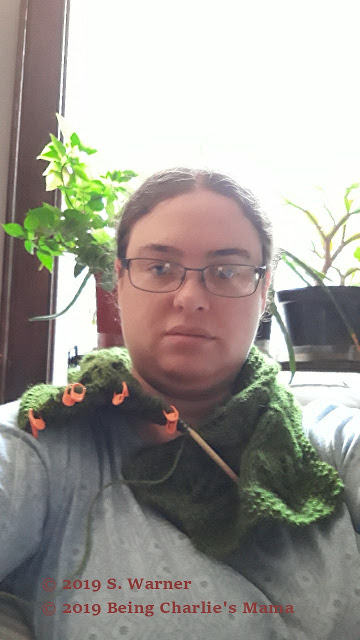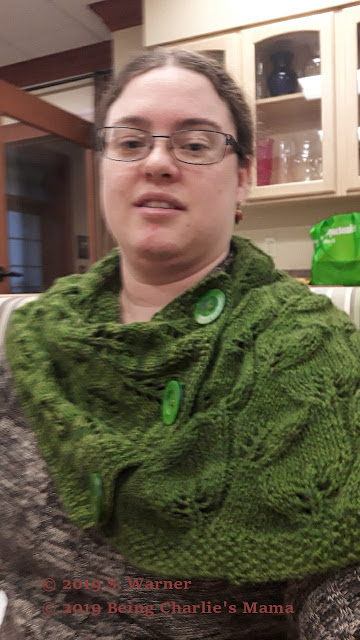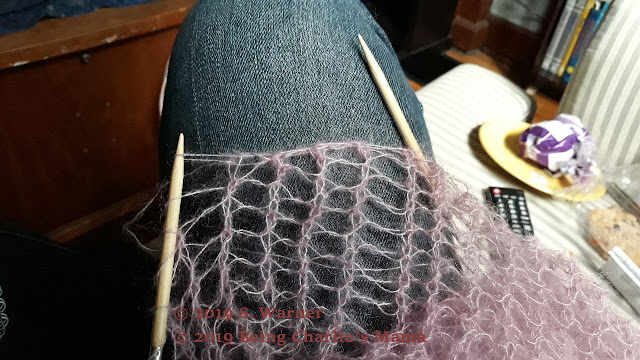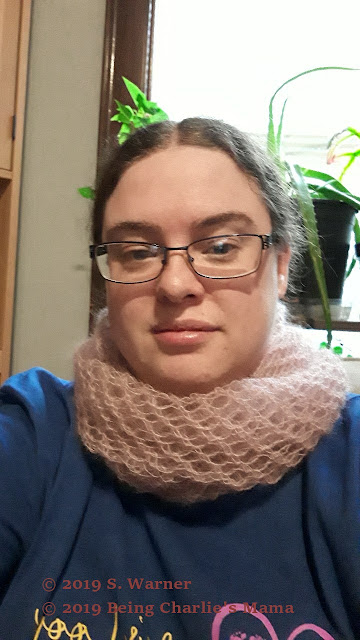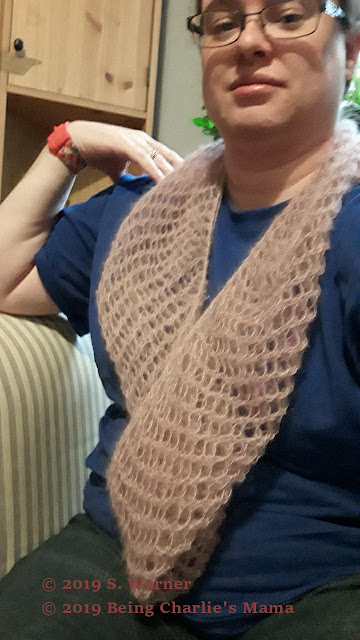(Topic: Words about death, opinions about effects of words)
Hi Friends,
One of the things I notice as the mom of a baby who died is that people sure use a lot of words about death that aren't
dead! Some of these words are fine, but some are possibly problematic for some people. Many of the words below are fairly generic, and a few are infant loss specific. The opinions are my own, but also based on what I have heard others say within the infant loss community.
1. Angel
This is a term commonly applied to a baby who dies. Some people love it and are comforted by the image of their child with wings. However, this is not a term I particularly like, although I use it often within the infant loss community because it's so common that it's easily understood. I try not to use the term to others, though, because there are several issues with the term. The first is that biblically, angels are a completely different being than humans, and have nothing to do with what happens when humans die. The second is that this is a Christian term, so it's alienating to any parent who is not Christian or not religious, and could make them feel left out, or guilty for not having that vision of their child.
Confusingly, outside the infant loss community, "angel" is often used to refer to children who behave well. This has actually led to several awkward situations for me personally - I have a shirt that says "mommy of an angel" but has a really obvious awareness ribbon (it should have been clear that I didn't just mean "well behaved"), but several people misinterpreted the shirt, and seemed uncomfortable when I pointed the awareness ribbon out and clarified.
2. In Heaven (in a better place)
Just like the term "angel," saying that someone's loved one is in heaven, if the parent didn't say it first, is assuming the parent's religious affiliation, and could alienate them if you guess wrong by using your own views. If the parent says it first, then they've informed you of their views, and it's probably safe to use. However, don't assume that heaven is a "better place." To me, and to many loss moms I've spoken to, the best place for a baby is in their parent's arms. Heaven somehow feels second best, and someone else telling me that it's better that he's there than here just feels like a slap in the face.
3. Dead
Honestly, I like the term dead. I mean, I don't love that my son is dead, but I love that when I say that, there is no ambiguity. No child will misunderstand me, and it's not a pat on the head like some terms for what happened. Watch the loss parent for clues, though: use the word they use, because it will most likely be the term they are most comfortable with. For me, the honesty and clarity of this term are important, but not all parents will feel the same way I do.
People also use "I'm dead" or "I died" figuratively when something is particularly funny or embarrassing, but this is not usually ambiguous because they are literally standing in front of you and clearly breathing.
4. Death
The same as "dead" - this term is unambiguous and direct, so I like it! For instance, I will say "since Charlie's death" rather than "since Charlie's stillbirth" or "since Charlie passed" because it's very clear what happened and doesn't mask it.
5. Died
I'm going to start repeating myself here! Yup, it's simple, effective communication. "Died" is exactly what happened. In our case, Charlie died before birth, but in the second half of the pregnancy, which means that when I gave birth to him, it was a "stillbirth." But regardless of the situation, he died, which also means that before that, he lived. Simple, unambiguous.
(Note that same as above with "dead", some people do use this figuratively when they feel embarrassed or found something particularly funny - but they are usually obviously still in front of you and alive, so it's clear that they are using it figuratively.)
(Also note that in some religions, societies, laws, and cultures, life is defined differently. Some view life as beginning with sperm (and maybe egg), others as beginning with conception, others as beginning when the baby starts to move (or "quicken") in the womb, and others when the baby breathes for the first time outside the womb. I personally believe that 1) it's complicated, and 2) conception is scientifically an important part, and 3) this doesn't mean that the baby's life is more important than the mother's. That's as far as I want to go into that issue here, but from the perspective of loss parents, the "official" time of beginning of life is less important than the beginning of their hopes and dreams for the baby, which usually begin right around when a couple find out they are expecting a baby. For them, that baby is a living baby from that moment on, at least in some ways.)
6. Deceased
Actually, this is my favorite option. You know why? It's just as clear as dead/death/died, because it has no other meanings at all. But our culture often cringes at the stark reality of dead/death/died, and deceased has a higher register (i.e. usually used in more formal circumstances), so it gives us the feel that we have put a bit of distance between us and the gross tragic reality. When I talk to strangers and Charlie comes up, usually because they ask how many kids I have, I often say "I have one son, he's deceased." The stranger is immediately informed of his death with no ambiguity or beating around the bush, but they are not as shocked as they would be with the immediacy of the word dead.
7. Passed away
If you think about it, "passed away" doesn't really have too many other interpretations even if you try hard, but because it's not as direct, it's still difficult to understand if you're a child or if your first language isn't English. If you are new to English in any way, it is easy to accidentally parse this as "passed" + "away", which sounds like "passed by" or other versions of people walking past you. So this can be misunderstood in some scenarios. "Passed away" is a collocation or phrase that only has one meaning when the words are together, but the words each have separate meanings that can confuse someone who doesn't realize that they form a very particular phrase.
It is also just so distant from what actually happened. Our culture likes to muffle death in phrases that disguise it, which might be easier on those not involved directly, but it makes it harder to be straight forward, and means that people who are grieving don't have their loss recognized as easily.
8. Passed
Oooh this one bugs me. I know it's just a shortening of #7, but because this isn't a whole collocation/phrase, it's now 100% ambiguous and ready to be misunderstood! I actually know someone who was told that a friend had "passed" - but because the friend was someone they knew from college, the listener misunderstood it as having passed the course or completed the degree. Which of course was not what the speaker meant - but it wasn't clear. If the speaker had at least used the whole collocation of "passed away" it would have been clearer. Unfortunately, this shortening is catching on. I'm seriously tempted to always misunderstand so that people realize how unclear it is.
9. Lost
"Lost" is a term that gets thrown around a lot but is actually quite problematic. Think about it: what does "lose" usually mean? It means misplaced, it means re-findable, and it means that it was someone's fault or negligence. Is that really what we are trying to say if we say "Susan lost her pregnancy" or "Sally lost her baby"? No! They can't find the baby again, the baby is dead. The baby isn't just misplaced. And it certainly wasn't Sally or Susan's fault or negligence in pretty much most cases. And it minimizes their grief a thousand-fold. What should you use instead? See what the mom and dad use. If they use "died", please be just as direct. If they use "passed away", mimic them and honor their level of comfort and directness. But please avoid the term "lost" because it has a HOST of guilt-inducing unintended meanings.
Additionally, this one is frequently misunderstood by older siblings of the baby, who are still young. Then they think there is a chance that the baby can be found, and get re-saddened when it is explained to them. Please just avoid this one.
10. Loss
Compared to "lost", which is a verb and implies action or neglect in the mother, "loss" is a noun and means that something is missing or gone. I actually like this word, in most uses and contexts. There is a loss in my life, of my son. The loss of his milestones. The loss of seeing him grow up. There are many "losses" associated with death and grief; more so the younger the person was who died. I suffered the loss of my son, because my son died (not because my son was lost - that would imply he misplaced his compass while hiking and could still be relocated). A "loss" is like a hole - a void where something was, that has been removed and is irreplaceable.
11. Gone
I bet you can guess what I'm going to say by now! "Gone" has too many other meanings to be used for death and still be clear. If I say that George is gone, does that mean he's dead? Or did he just leave the office early for a dental appointment? Seriously, this is sooooo vague. And again, not clear to children, which is one of my biggest pet peeves with our euphemisms. I would suggest avoiding this one entirely.
12. Left us (too soon)
I have mixed feelings on this. "Left us" is, like "gone", really vague and has many other possible meanings. That said, when used in the phrase "left us too soon", this seems not to be used much except regarding death, usually the death of a child before a parent (at any age). I actually did use this on Charlie's gravestone, but on a gravestone is not an ambiguous place to use it. So I would use this phrase very cautiously, and only if it is going to be completely clear; for instance, if it has already been clearly said that the person is dead, and this is an added comment. However, I might suggest that this be left for parents to chose to say, rather than something you can say to them - because it could come across as you making assumptions. This is not as bad as others, though, since the assumption basically implies that the parents miss the child (likely) and that they would rather have the child back, safe and alive (also extremely likely).
13. Body
A few thoughts on terms for the actual corpse. "Corpse" is generally considered fairly vulgar or technical, depending on context, so I decided to not give it its own number in this list. I suspect most people will shy away from it, even blunt people about their own folks (I consider myself fairly blunt, but would not generally use the word "corpse" to refer to Charlie). However, let's take a look at "body" briefly: it's very, very matter-of-fact. It's not exclusive to dead people (whereas corpse is) but it is usually used in contexts that are very clear. It's fairly blunt, but not gross and not false. I will talk about Charlie's "body" occasionally, but usually I just talk about Charlie (I'm more likely to say "we buried Charlie" than "we buried Charlie's body" - but I'm fine with either - I just usually don't feel the need to specify "body" because that's obvious - unless I am being specific when talking to someone who just mentioned their child's ashes, for instance). I really included "body" because it contrasts with the next two words.
14. Remains
The "remains" are what are left behind. So the word "remains" implies that something has been removed or has left the body. I think this is used in our culture because there is a pervasive idea that the "self" of the person has somehow gone away - whether as a Christian soul (other religions have similar concepts) or whether simply as a form of "self". So what "remains" is the body, which can be called "remains". I would like to point out, though, that anything resulting from what we do with that body still end up being "remains" too - whether we embalm, or whether we cremate, or whether it's later and it's a mummy or bones. All of these - bodies or ashes or bones - are "remains".
15. Cremains
So to follow on that concept, if we cremate and what is left are still "human remains" but in the form of ash, who thought up this ridiculous word? UGH - this one gives me hives. Human remains are human remains, whether ash or bone or embalmed or mummified. So - if we have to say "cremains" (WE DON'T), then are bodies that are embalmed "emb-mains"???? I thought not. Say "ashes" if you want to be super clear about it not being a "body".
Side note: baby vs fetus, and other thoughts about asking personal questions in public
Occasionally you will hear loss parents complain when a medical professional - or worse yet, someone in everyday life who may be
retired from medical life - call a baby who died during a pregnancy "a fetus". Here's why we complain: while they are
technically right (embryo and fetus are technically two phases of development of the baby in utero), the fact is that to the parents that is
their baby, with all of the associated love and feelings. To have someone use a technical term that feels like it negates the love and hope, that's extremely hurtful. There are doctors who realize this, and when talking with parents will only call it a baby, but some don't realize. I've had this happen to me (with a retired labor and delivery nurse, who had
not realized the pain and dissociation she was causing). I tried to explain it to her, several times, and ended up leaving a group when I realized she was not going to even try to change her terminology despite knowing that it was hurtful to someone right in front of her.
Please try to listen and observe loss parents you come in contact with. While some of what they request might be personal preference, most of what they say will be helpful for you to consider applying broadly to any loss parent, or even more broadly in life in general. For instance, asking if someone has kids or how many kids they have is
almost always a more complicated question than it sounds like (did they have fertility issues? Pregnancy or infant loss? What about custody issues or legal issues with their children being taken away?). I suggest not asking, or asking very obliquely if you have to ask. Many parents will volunteer the info they want you to know, and the rest is (respectfully) none of your business.
Thank you for listening to my suggestions, as a fairly outspoken loss mom, on the topic of words concerning death. I hope that my thoughts are helpful to you, and that you take a moment to chose the word you really mean, the next time you speak of someone who died.
Lots of love,
Yours,
Sarah
To subscribe, find the "subscribe by email" note in the left column and enter your email there. Links to posts will be emailed directly to you whenever I post them! Nothing else gets emailed.
Resource list: Visit my spreadsheet at www.tinyurl.com/infantloss


